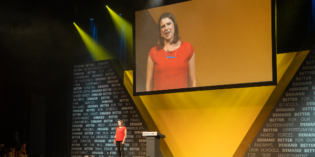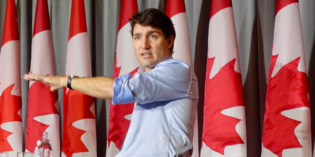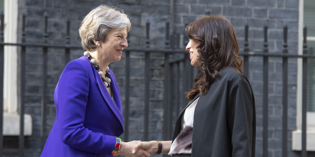
The empty centre: why the Liberal Democrats need to demonstrate competence and unity to win votes
Liberal parties in western democracies which advocate broadly centrist economic policies, such as the Liberal Democrats, have performed badly in some recent elections, even though their policies are often in tune with a large proportion of the electorate. Using survey data Roi Zur finds they have little scope for winning votes by shifting in either direction on the left-right spectrum. Instead they need to demonstrate they are a credible and competent governing party, able to prevent Brexit, and are not just expressing their opposition to it.

Book Review | Emergency Chronicles: Indira Gandhi and Democracy’s Turning Point by Gyan Prakash
In Emergency Chronicles: Indira Gandhi and Democracy’s Turning Point, Gyan Prakash challenges historiography that presents the Emergency of 1975–77 as an anomalous period in India’s recent history, instead showing how it grew out of existing political traditions, the legacies of which can still be felt in the present. This valuable analysis not only shows how Indian socioeconomic structures have moulded its politics, but also suggests a way to understand the wider challenges facing contemporary politics in many parts of the world, writes Ben Margulies.

Canada’s 2019 federal election: is the first-past-the-post electoral system broken?
In Canada’s recent federal election, the most popular party by vote share, the Conservative Party, did not gain the most seats in parliament and smaller parties also lost out, to the benefit of Justin Trudeau’s Liberal Party, who will form a minority government. Chris Stafford assesses what this means for the country’s on-going debate on electoral reform.

Are the DUP for turning? When the Union is perceived to be at risk, all options are on the table
The UK government’s latest attempt to push a deal through Parliament failed when the DUP withdrew support. Mary C. Murphy explains the DUP’s thinking and options. She writes that, while they can continue to pursue a strategy which is focused on revising the deal to their satisfaction, it is also possible that they could change tack completely and re-align their position in favour of the UK remaining in the EU.

Citizens (mistakenly) perceive female-led political parties as more moderate
Does women’s leadership affect citizens’ perceptions of political parties? Diana Z. O’Brien shows that female-led parties are perceived as more moderate than male-led organisations, even though election manifestos authored by these parties are actually slightly more extreme than those by male-led parties.

Book Review | The Far Right Today by Cas Mudde
In The Far Right Today, Cas Mudde provides readers with a comprehensive overview of contemporary far right politics: a pressing task considering that groups or parties once located on the fringe of mainstream politics have experienced a surge in popularity over recent years across Europe and beyond. The most worrying aspect of this surge, argues the author, is the mainstreaming and normalisation of the far right. This is an excellent, accessible and timely book that effectively challenges conventional thinking on the topic, writes Katherine Williams.

Northern Ireland and the Withdrawal Agreement
Boris Johnson’s proposed withdrawal agreement with the EU, which Parliament votes on today, establishes different customs arrangements for Northern Ireland than for Great Britain, to avoid a hard border with the Republic of Ireland. Sean Swan explains how having differential arrangements for Northern Ireland and Great Britain is not novel, and is a reflection of long-existing realities in Northern Ireland’s governance. For them to have democratic legitimacy, though, the Northern Ireland Assembly needs to be reconvened.

Is the resurgence of Europe’s far-right a cultural or an economic phenomenon?
There has been a spectacular rise in support for far-right parties in Europe over the last two decades, but what has driven this electoral success? Drawing on new research, Vasiliki Georgiadou, Lamprini Rori and Costas Roumanias demonstrate that different types of far-right party have benefitted from different factors: economic insecurity has helped increase support for ‘extremist right’ parties, while cultural factors have been associated with the growth of the ‘populist radical right’.

Requiring voter ID in British elections suggests the government is adopting US ‘voter suppression’ tactics
This week’s Queen’s Speech revived proposals to introduce photographic ID requirements for voting in British elections. The Democratic Audit team assess the available evidence on the likely consequence of such a measure, and consider whether the legislation tackles the right priorities for improving our elections on which there is consensus, or suggests moves to enhance Tory election chances via excluding voters presumed unfavourable to them.

Book Review | This Is Not Propaganda: Adventures in the War Against Reality by Peter Pomerantsev
In This Is Not Propaganda: Adventures in the War Against Reality, Peter Pomerantsev takes readers on a gripping journey through the disinformation age, drawing on his own family history as well as encounters with numerous figures positioned on both sides of the information spectrum: those working to manipulate our perceptions and those engaged in the struggle for a more facts-based public sphere. Ignas Kalpokas highly commends and recommends this elegantly written and compelling book that reveals the dizzying whirlwind in which reality is caught today.




 Democratic Audit's core funding is provided by the Joseph Rowntree Charitable Trust. Additional funding is provided by the London School of Economics.
Democratic Audit's core funding is provided by the Joseph Rowntree Charitable Trust. Additional funding is provided by the London School of Economics.